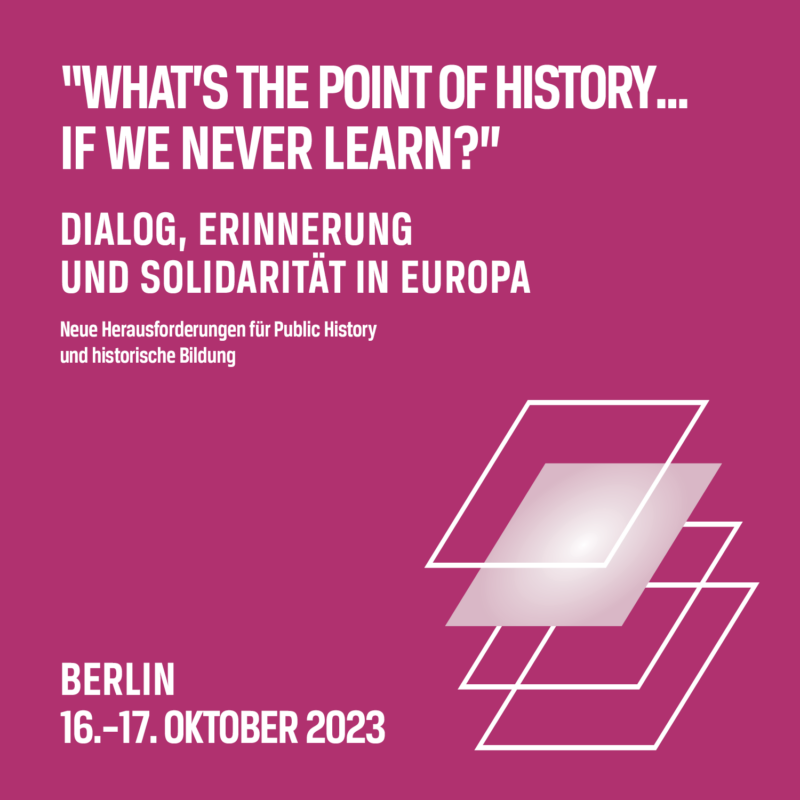Internationales Forum: Dialog, Erinnerung und Solidarität in Europa / Dialogue, Remembrance and Solidarity in Europe

16.10.2023 um 12:00 Uhr
16–17 October 2023Stiftung Humboldt Forum im Berliner Schloss
Schlossplatz,
10178 Berlin
'What's the Point of History ... If We Never Learn?'*
Dialog, Erinnerung und Solidarität in Europa
Neue Herausforderungen für Public History und historische Bildung
Veranstalter
- Europäisches Netzwerk Erinnerung und Solidarität
- Bundesinstitut für Kultur und Geschichte der Deutschen im östlichen Europa
in Zusammenarbeit mit der - Stiftung Humboldt Forum im Berliner Schloss
Nahezu acht Jahrzehnte nach dem Zweiten Weltkrieg und zweieinhalb Jahrzehnte nach den Jugoslawienkriegen ist der Krieg nach Europa zurückgekehrt. Der russische Angriff auf die Ukraine hat unsere allgemeine Gewissheit, dass wir die richtigen Lehren aus der Vergangenheit gezogen haben, in Frage gestellt.
Hinzu kommt die Erkenntnis, dass die spezifischen regionalen und nationalen Erfahrungen ungeachtet eines gemeinsamen europäischen Wertefundaments immer wieder zu Irritationen führen. Erinnerungskulturelle Heterogenität besteht dabei nicht nur zwischen, sondern auch innerhalb der europäischen Länder, in denen verschiedene gesellschaftliche Gruppen teils polarisierende historische Narrative vertreten. Solche miteinander konkurrierenden Sichtweisen auf die Vergangenheit beeinflussen zunehmend die Perspektiven auf die Gegenwart und damit auch das aktuelle politische Handeln in Europa.
Staatliche Geschichtspolitiken stehen dabei im Wechselwirkung mit verschiedenen zivilgesellschaftlichen Erinnerungspraktiken. Gelegentlich scheint sogar der um das Jahrtausendwende begonnene Diskurs über eine gemeinsame europäische Vergangenheit als Grundlage einer handlungsfähigen europäischen Gemeinschaft grundsätzlich in Frage zu stehen. Ist gemeinsames Erinnern angesichts der Unterschiedlichkeit der Erfahrungen überhaupt möglich? Lassen sich nationale Interessen und internationale Solidarität miteinander verbinden? Und schließlich: Welche Anforderungen stellen die Migrationsbewegungen der letzten Jahre an europäische Erinnerungspraktiken und die historische Bildungsarbeit?
Die Veranstaltung möchte die Vielfalt der Perspektiven in Europa vor Augen führen und darauf aufbauend über die gegenwärtigen Herausforderungen für die Geschichtsvermittlung im öffentlichen Raum und für die historische Bildung diskutieren.
Dabei soll das Potential einer gemeinsamen Auseinandersetzung mit der Vergangenheit und deren Bedeutung für das Streben nach Wahrheit, Frieden, Demokratie, Freiheit und Toleranz im Fokus stehen sowie für ein Erinnern, das Unterschiede würdigt, Verbindendes sucht und durch Dialog die Verständigung und Solidarität in Europa stärkt.
Angesprochen sind insbesondere Vertreter/-innen aus der Politik, von Einrichtungen der kulturellen Bildung sowie Akteurinnen und Akteure im Bereich der historisch-politischen Bildung; die Teilnahme steht allen Interessierten offen.
Die Veranstaltung wird simultan gedolmetscht.
Eintritt frei
Programm (Deutsch)
Presseinformation (Deutsch)
Das Europäische Netzwerk Europäische Erinnerung und Solidarität, Warschau, fördert den Dialog über die Geschichte Europas im 20. Jahrhundert. Seine Arbeit im Bereich von Wissenschaft und kultureller Bildung wendet sich an unterschiedliche Zielgruppen. Das ENRS unterhält Kontakte zu etwa 400 Partnerorganisationen in Europa.
* "Was ist der Sinn der Geschichte, wenn wir nicht daraus lernen?" - Aus dem Text eines Liedes, geschrieben 2022 von jugendlichen Teilnehmer/innen am ENRS Geschichtsprojekt „Sound in the Silence“ in der KZ-Gedenkstätte Gusen
English Version
'What's the Point of History ... If We Never Learn?'*
Dialogue, Remembrance and Solidarity in Europe
New Challenges for Public History and Historical Education
Organisers
- The European Network Remembrance and Solidarity
- The Federal Institute for History and Culture of the Germans in Eastern Europe
in cooperation with the - Humboldt Forum, Berlin
Almost 80 years after the Second World War and 25 after the war in former Yugoslavia, fighting continues in Europe yet again. The Russian attack on Ukraine has challenged our certainty that we have learned the right lessons from the past. This is accompanied by the awareness that individual local and national experiences still lead to tensions despite the foundation of shared European values. Heterogeneity in the culture of memory exists not only between European countries but also within them as different social groups represent divergent historical narratives. Diverse outlooks on the past shape the perception of the present and influence political actions across Europe.
The politics of memory of any given country is not always identical with the memory policy of civil society. Occasionally even the discourse about a common European past that began at the turn of the millennium, serving as the foundation of a European community able to act in unison, seems to be called into question. Given such diversity of experiences, is a common memory possible at all? Can national interests and international solidarity be reconciled? And last but not least: what challenges do European practices of remembrance and historical education face in the light of the migratory movements of recent years?
The Berlin event aims to showcase the diversity of perspectives that serve as a basis for discussing the current challenges for history teaching in public spaces and historical education. During the forum, we wish to focus on a shared conversation about the past and its importance for seeking the truth, peace, democracy, freedom and tolerance, as well as for a remembrance that respects differences, looks for connections and strengthens understanding and solidarity in Europe.
The forum will be attended by politicians and representatives of cultural educational institutions, as well as actors in the field of historical and political education.
Admission is free.
Programme (English)
Press release (English)
The European Network Remembrance and Solidarity (ENRS) with its registered seat in Warsaw promotes dialogue about 20th-century European history. It carries out activities in the fields of education and cultural dialogue for various target groups. The ENRS connects more than 400 partner organisations across Europe.
*) The phrase 'What's the point of history ... if we never learn?' is a quotation from a song written and then performed by the participants of the educational project 'Sound in the Silence' at the Gusen Memorial in 2022.
